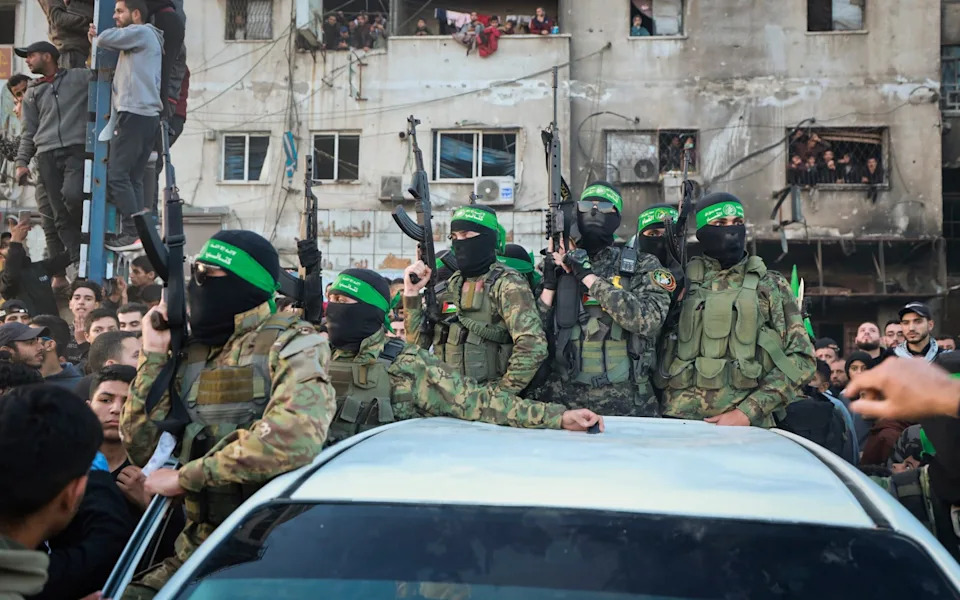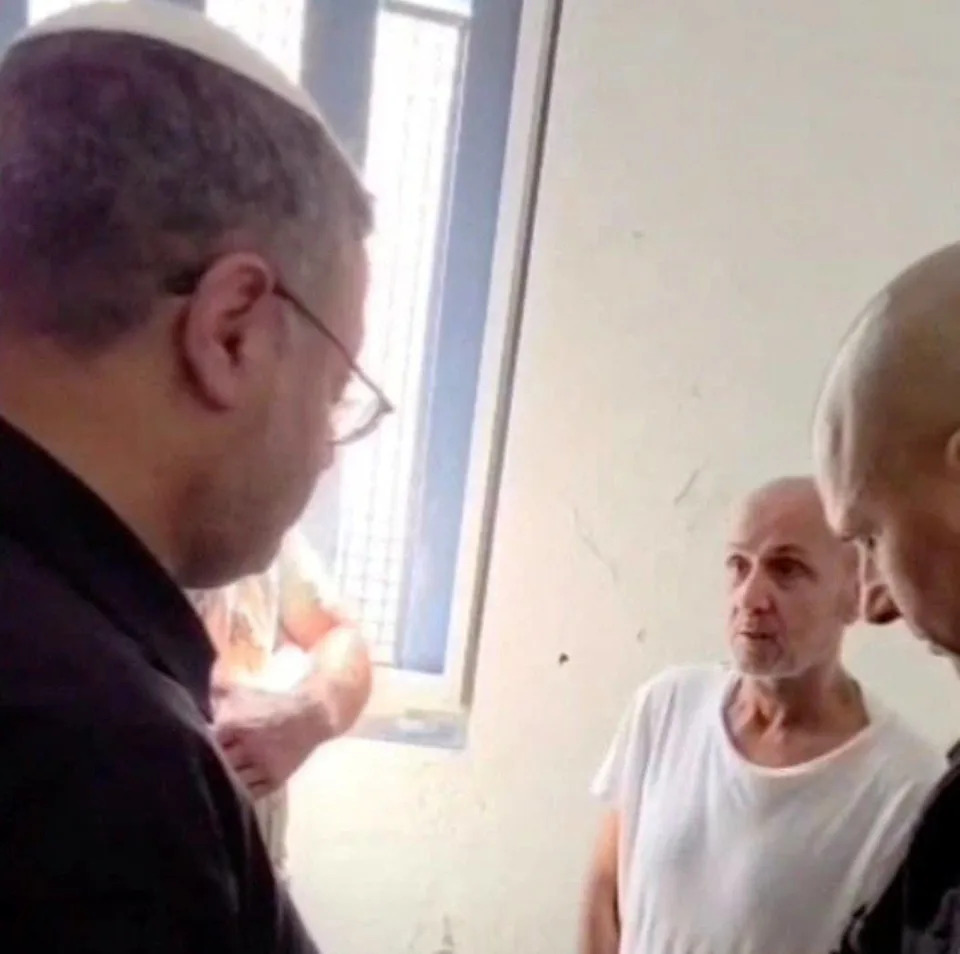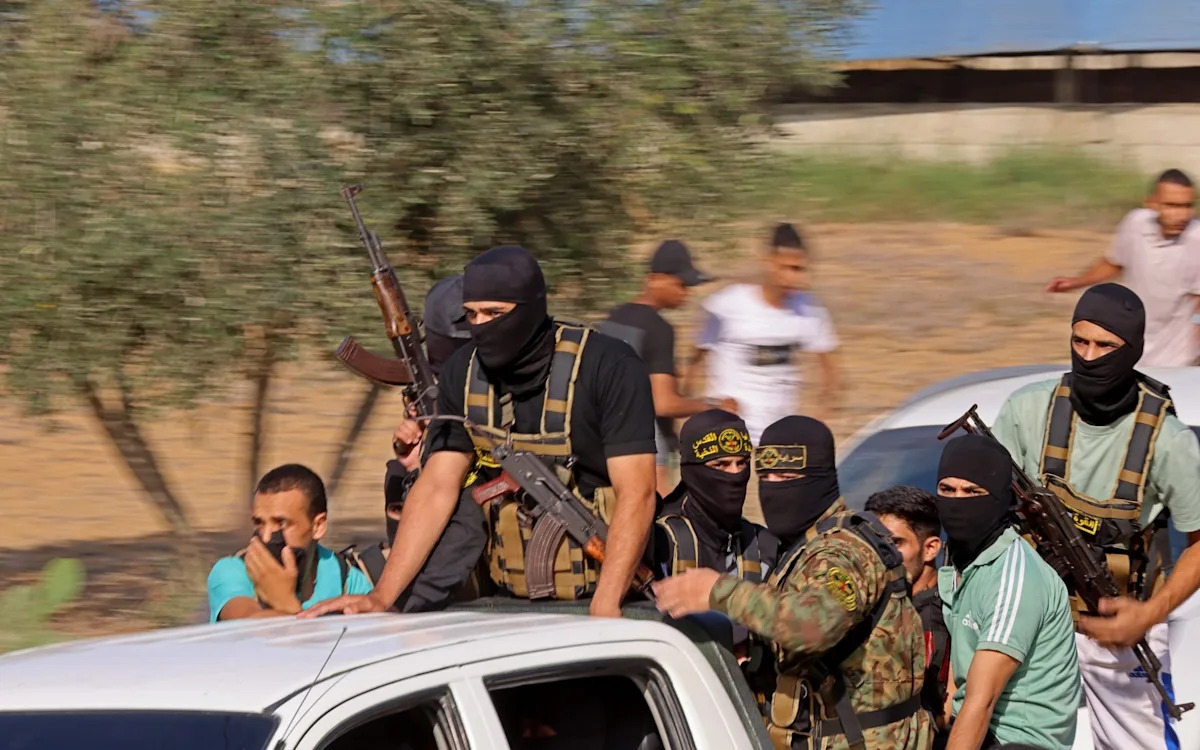Hamas has demanded the release of captured terrorists who took part in the Oct 7 massacre, sources have said.
The terror group has reportedly requested that “Nukhba fighters”, the elite special forces unit that led the massacre, be added to the list of imprisoned Palestinians slated for release in exchange for the Israeli hostages.
The demand risks scuppering any chance of a deal.
The news emerged as an official close to the talks in Sharm el-Sheikh warned that the negotiations could last several days, despite pressure from Donald Trump to reach a deal quickly.
In an effort to encourage Mr Trump to secure an agreement, families of the hostages have called for the Norwegian Nobel Committee to award Mr Trump the Nobel Peace Prize.
Israel has released hundreds of Palestinians under the previous two ceasefire deals, including senior terrorists serving life sentences.
However, as a matter of principle, they have always point-blank refused to release those captured on Oct 7, many of whom belong to the Nukhba force.
Israel’s Channel 12 News has now reported that Hamas has demanded that some of these be released.
Doing so would be hugely politically damaging for Benjamin Netanyahu’s government, yet some commentators have voiced fears that the White House might try to force such a concession on Israel in order to achieve a deal.

Hamas has reportedly requested that ‘Nukhba fighters’ be added to the list of currently imprisoned Palestinians slated for release – AP Photo/Abed Hajjar
Hamas has also reportedly demanded the release of high-profile terrorist masterminds from the second intifada, who are serving life sentences.
Israel has previously reserved the right to veto the release of symbolic prisoners, particularly those with the most blood on their hands.
The provisional outline of the deal, to which Mr Netanyahu signed up last week, obliges Israel to release 250 of the 285 Palestinian prisoners serving life sentences.
That gives them the room to prevent the release of figures such as Marwan Barghouti, referred to by some as Palestine’s Mandela and a potential future leader.
Itamar Ben-Gvir, the ultra-nationalist national security minister, has reportedly warned Mr Netanyahu against releasing politically symbolic figures.
Non-political Israeli security officials are also said to be against it.

Itamar Ben-Gvir, Israel’s national security minister, shared a video on X in August in which he taunted Marwan Barghouti (centre) in prison
Negotiations began in Sharm el-Sheikh on Monday, but these were indirect, technical talks.
Ron Dermer, who leads the Israeli negotiating team, arrives on Monday and will take part on Tuesday.
Steve Witkoff and Jared Kushner, representing Mr Trump, will also join the discussions on Tuesday.
Mr Trump has urged all sides to “move fast” towards an agreement, aiming for the “first phase” of the deal to be struck this week.
But Karoline Leavitt, White House press secretary, offered no timeline for talks when asked for details during her briefing on Monday.
She said: “I don’t want to draw a red line up here. Of course, it’s very important, as I just mentioned, that we get this done quickly.
“That’s how the president’s team feels, so we can get some momentum, get the hostages out, and then move to the next part of this, which is really ensuring that we can create a lasting and durable peace in Gaza and ensure that Gaza is a place that no longer threatens the security of Israel or the United States.”
The precise timings of the withdrawal of the Israel Defense Forces (IDF) are another point of potential disagreement between Israel and Hamas.
However, both sides have agreed to Mr Trump’s 20-point plan in principle and promised to enter the talks in good faith.
Israel will try to retain as much control as possible over the process of disarmament, as well as attempting to delay the withdrawal of the IDF.
It is politically important for Mr Netanyahu to be able to say that he recovered the hostages and defeated Hamas without being forced to leave Gaza.
He has already made the claim in video addresses which appears to contradict the terms of the plan. It proposes a demilitarised Gaza free of the IDF and policed by an international stabilisation force, most likely comprising Arab troops.
Credit: Benjamin Netanyahu via Telegram
For its part, Hamas may argue for provisions that make it easier to stow away weapons in order to attempt to exert control again in the future, some analysts fear.
On Monday, families of hostages held in Gaza urged the Norwegian Nobel Committee to award Mr Trump the Nobel Peace Prize this month over his efforts to secure the release of their loved ones.
The families have by and large become increasingly scathing of Mr Netanyahu’s performance in ending the war, but have always sought to appeal to Mr Trump, often with overt flattery, as offering the best hope for the hostages.
Mr Trump openly covets the prize, which Barack Obama won less than eight months after taking office.
Despite the negotiations, Israeli jets continued to strike targets in Gaza in the past 24 hours.
The IDF said at the weekend it had moved into a defensive posture, while the talks took place.
The recent strikes were said to be against Hamas militants preparing to attack Israeli troops.
On Monday, Abdel Fattah el-Sisi, the Egyptian president, said true peace in the Middle East would not be achieved without an independent Palestinian state.

